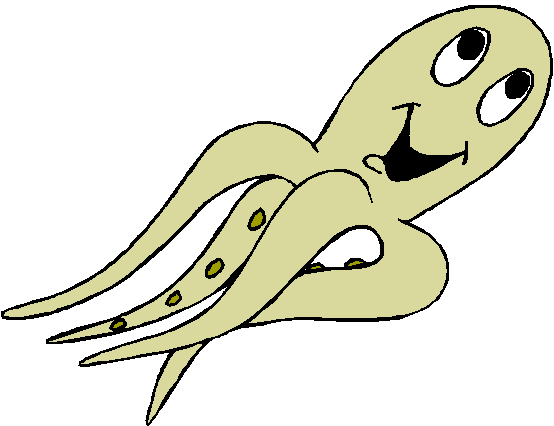Octopus Factoids
- The plural of “octopus” is
not “octopi” because

the original word is in Greek, not Latin. The plural of
the Greek word should be “octopodes,” but the
form most commonly used is “octopuses.”
- It is proper to call the eight extremities "arms"
instead of
"tentacles" when talking about
the Pacific octopus. “Tentacles” are used by squid
to capture prey. These “arms” are used for
much
more.
- The octopus lives 3-5 years. It is believed 5 is their maximum
age, even without mating.
- In captivity, these octopuses are frequently named because
each displays its own unique
personality.
- The octopus's brain continues to increase in both
size and cell number
throughout its
entire life.
- The Pacific octopus can fit through any opening larger
than its beak. Yes, this means the
50+ pound creature can fit through a hole about two inches
wide. Don't believe me?
Check
this
video out!
- They have three hearts. Two are used to pump blood to
the gills, one is used to pump
blood to the rest of the body.
- E. dofleini's blood appears blue when
oxygenated. This is because hemocyanin contains
copper compounds.
- Pacific octopuses have great regeneration capabilities.
One can re-grow up to one-third
of its arm, complete with pigmented chromatophores and suckers, in less than six
weeks.
- The Pacific octopus is the largest species of octopuses
in the world. The greatest Pacific
octopus ever recorded weighed
about 600 pounds and stretched 30 feet across!
- Giant Pacific octopuses are fished for off of the coasts of
North America and Japan.
They are then sold as human food or fishing bait.
- These creatures are occasionally cannibalistic and eat
members of their own species.
- A Pacific octopus has been observed attacking a diver.
The video can be watched
here.
- Octopuses are poikilotherms. Their metabolism
slows down in cooler water, which
causes them to become
significantly less active
than they are when in warmer water.
- Only about 2 of 57,000 Pacific octopuses will grow
to maturity.
- A Pacific octopus can be kept as a pet. But it
requires at least a 400 gallon tank, due to
its size.
Back to Intelligence Forward to References